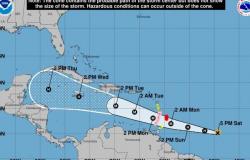Researchers call the dogs “sentinels” of human well-being, since they can be clear indicators that reflect human health. This is in part due to their close companionship with humans and how their lives are intertwined with their owners’ daily environments and routines.
While humans can reflect the health of their environment, dogs can also reflect this back to humans, as they share their living spaces and resources.
Academics have found it very difficult to quantify the quality of life of a person over the years, but dogs could be a useful indicator. A recent perspective publication in Science states that “recent and emerging research reveals that companion animals are clearly positioned to be sentinels of public health, social well-being, and individual health.”
What are the environmentally harmful factors?
toxins in the environment, such as air pollution from heavy metals, contribute to worse human health. Poor air quality can manifest itself as asthma attacks in people prone to asthma, but the The impact of most toxins does not become clear until later in life..
For example, previous research has indicated that Air pollution may increase Covid-19 transmission risks and even developing cancer. In addition to developing respiratory illnesses or other health conditions, environmental toxins can also worsen mental health and cognitive function.
Dogs Share Many of These Same Risk Factors. The authors offer a strong comparison when they write: “Dogs may be particularly affected by invisible pollutants in the air and on the surface because of the way they move through the world, with their noses, paws, and mouths touching almost everything, which is also similar to how humans do it. “Babies interact with their environment.”
They also compare the presence of companionship, resources, care and income, as well as the effects of age, with those of humans, suggesting that canines are “no different.” A dog’s breed can even reflect a person’s socioeconomic status as unfortunately, certain types of breeds may limit your access to housing in certain areas.
More dog data can increase understanding of people’s lives
Researchers Courtney Sexton and Audrey Ruple reviewed the literature to reach these conclusions, suggesting that more data needed on canines to fill the gaps in knowledge about the state of human well-being in the world. Technology and wearable devices can help with this, as tagged dogs and smartphone apps can increase the availability of data on dogs and human participants in larger regions of the world.
Data already available includes veterinary databases, neighborhood demographics, air quality, and access to care information. Lack of standardized reporting measures on companion dogs limits further understanding of this connection.
The authors suggest that veterinary medicine incorporate demographic variables of dog owners to close the gap between species and benefit both dogs and people.
News source:
Science: Canine sentinels and our shared exposome









